The ESC 22nd annual conference took place in Malaga from 21 to 24 September 2022. More than 10 panels with 48 presentations were held under our Working Group on a wide range of topics related to the impact of the Covid-19 pandemic on crime and criminal justice system.
Have a look here at some presentations of the Working Group members
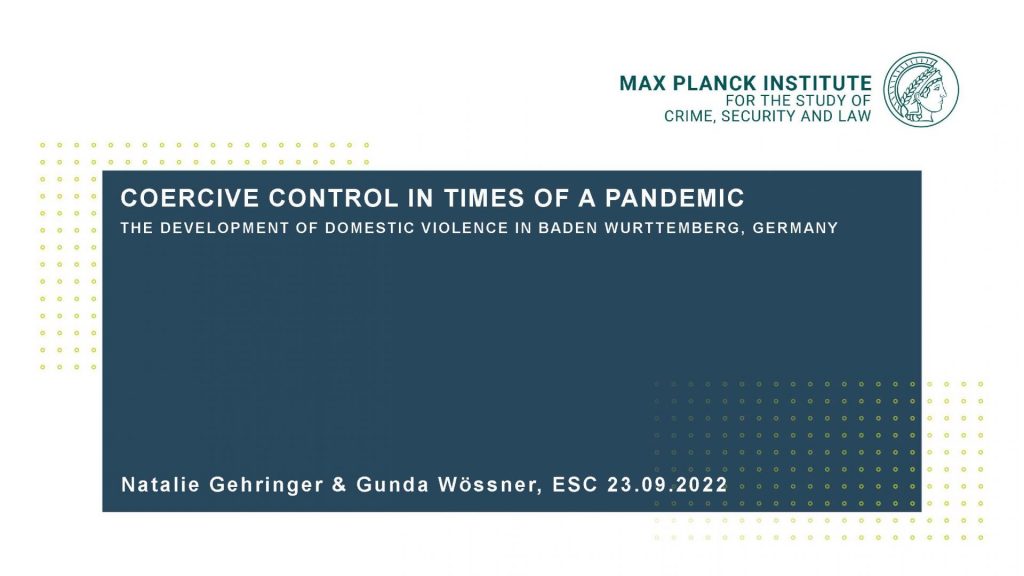
Intimate partner violence does not manifest itself only in physical violence. Several studies have repeatedly shown that – above all – women who are victims of intimate partner violence might experience psychological violence, e.g., in the form of humiliation, threats, and social isolation, more often than physical violence. Furthermore, psychological violence has been identified as a precursor of physical violence. Stark’s (2009) concept of coercive control explains the systematic use of violence to intimidate the partner. The effects for the victims are often invisible to the naked eye. In the wake of the Covid-19 pandemic, measures were introduced to fight the global spread of the pandemic. Lockdowns forced many women and children to self-isolate in their own homes, thus forcing them into social isolation and to live in violent households under the permanent presence of the perpetrator. The project “The Impact of the Covid-19 Pandemic for Crime in Southwest Germany” conducted at the Max Planck Institute for the Study of Crime, Security and Law in Freiburg/Germany, aims to investigate the effects of lockdown measures on the life of victims of intimate partner and sexual violence – on the basis of interviews with professionals from counseling centers against intimate partner and sexual violence. In this presentation, the authors outline the dynamics of coercive control during the Covid-19 pandemic and describe how this form of psychological intimidation has come to a head in times of the pandemic.
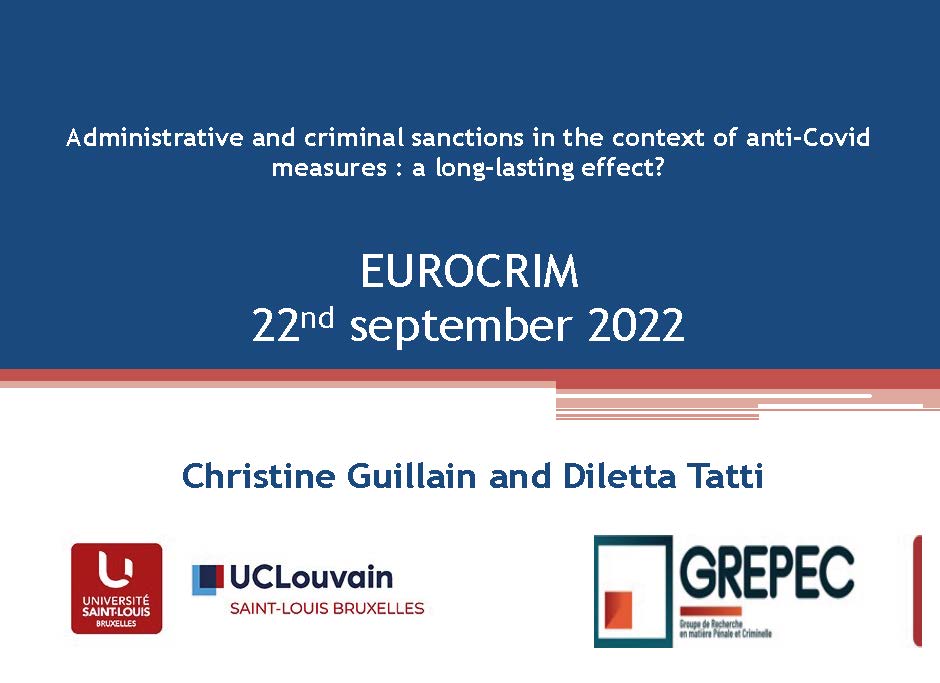
The criminal transaction procedure is a pre-trial settlement whereby the public prosecutor abandons the prosecution in return for payment of a sum of money by a suspect. This procedure, which was rarely used before the health crisis, has been widely used by the prosecutor’s office to deal with Covid health offences. In addition to this mechanism, the use of the immediate criminal transaction has also developed in this context. This extrajudicial procedure provides for the police to offer the suspect payment of a fine directly at the scene of the offence, using a contactless terminal or QR code technology.
Following this large-scale experiment during the health crisis, this procedure has just been extended to “minor” offences such as simple theft, possession of drugs, or carrying prohibited weapons. Based on the issues raised by such procedures and highlighted in the context of health offences, we propose to question these practices, which are now integrated into longer-term criminal policies.
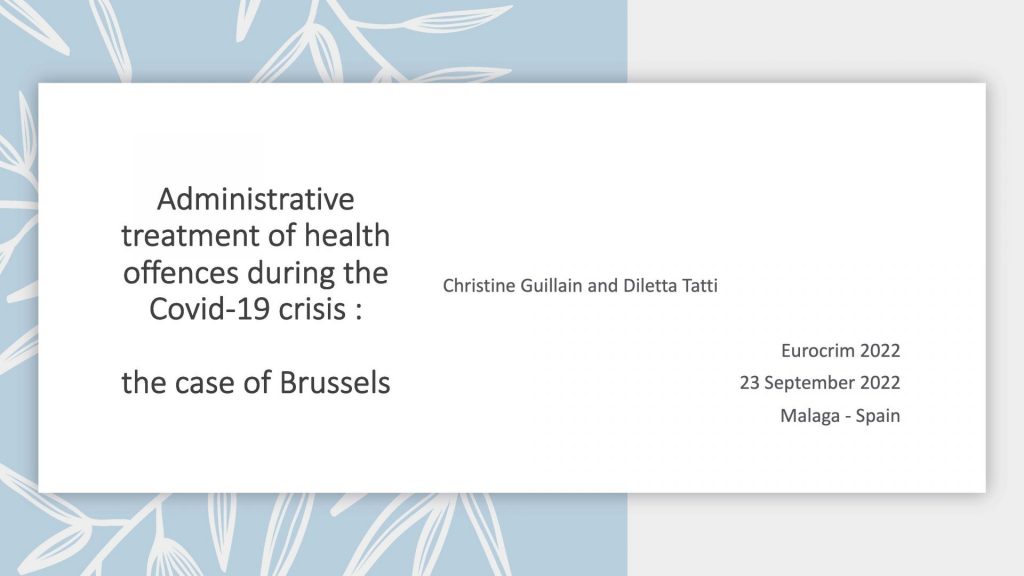
At the beginning of the health crisis, the repression of Covid offences was entrusted to the criminal authorities in Belgium. However, in response to the emergency, some municipalities in Brussels set up a system of repression based on municipal administrative sanctions. Endorsed by the legislator at a later stage, this system provided for an unprecedented articulation of repression: the administrative proceeding took precedence over the criminal one. This mechanism was also applied differently by each of the 19 municipalities that make up the Brussels Region. The purpose of this contribution will be to present some of the major issues relating to the use of administrative sanctions in this context. They are the result of field observations, data collection and qualitative interviews, conducted as part of a research project financed by the National Fund For Scientific Research (FNRS) and entitled “Municipal administrative sanctions in the context of anti-Covid measures: administratisation of criminal justice and respect of fundamental rights“.
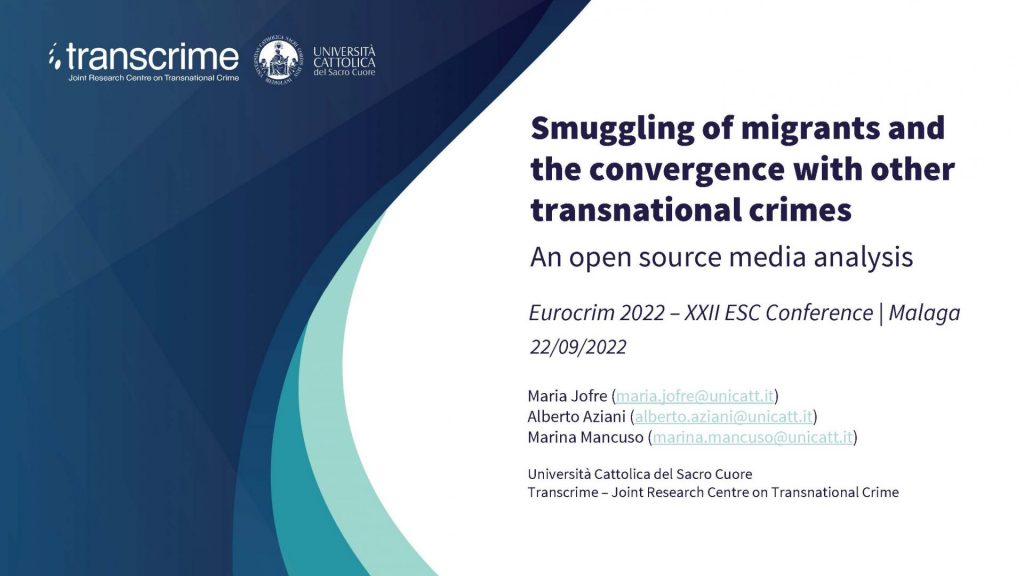
There is debate about the simultaneous occurrence of human smuggling and the transnational trafficking of goods, the current evolution in reaction to the COVID-19 pandemic, as well as the threat that the convergence of these crimes represents for society. However, empirical evidence of the degree to which the smuggling of migrants converge with the trafficking of goods is scant. We test whether convergence occurs, and if so, to what extent. For this end, we design and implement an innovative methodology based on text analytics and open source data. Results show that although there is a convergence between human smuggling and other transnational crimes, this occurrence is rather episodic (3.4% of episodes). In addition, exploratory results suggest that COVID-19 has not had an impact on the simultaneous occurrence of human smuggling and the transnational trafficking of goods. The results expand extant knowledge about the functioning of human smuggling and provide policymakers with concrete solutions to combat its convergence with other transnational crimes.
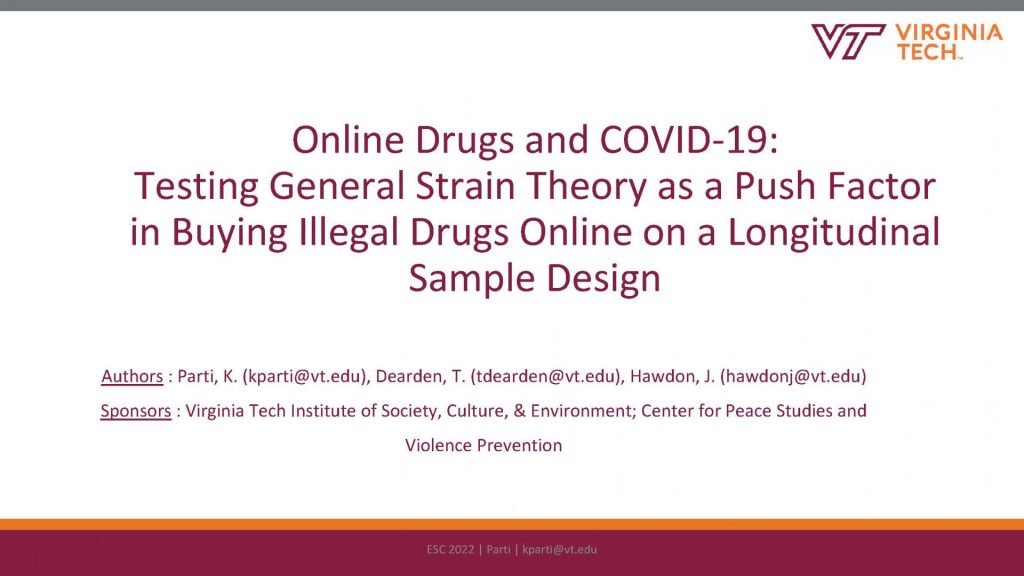
As the COVID-19 pandemic unfolded, we tracked longitudinal data to see if illegal online drug purchases were changing over time, or if it was caused by users adjusting to new market conditions or by an increased level of strain from the pandemic leading to increased demand for drugs. A total of 4653 participants from across the US completed an online survey over four waves between Fall 2019 and Fall 2021. Online drug purchases increased across waves. Participants who bought illegal drugs online reported 5.2 strain events in the last year compared to 2.4 in those who did not. In the third wave, pandemic-induced strain-related illicit drug purchases increased significantly, even though there was no correlation between strain and COVID-19 during the first two waves. Because traditional, offline means of obtaining drugs of choice are fewer, some users have turned to online purchases. In addition, lockdowns resulting from COVID-19 may have led to increased strains because there was more demand for drugs.
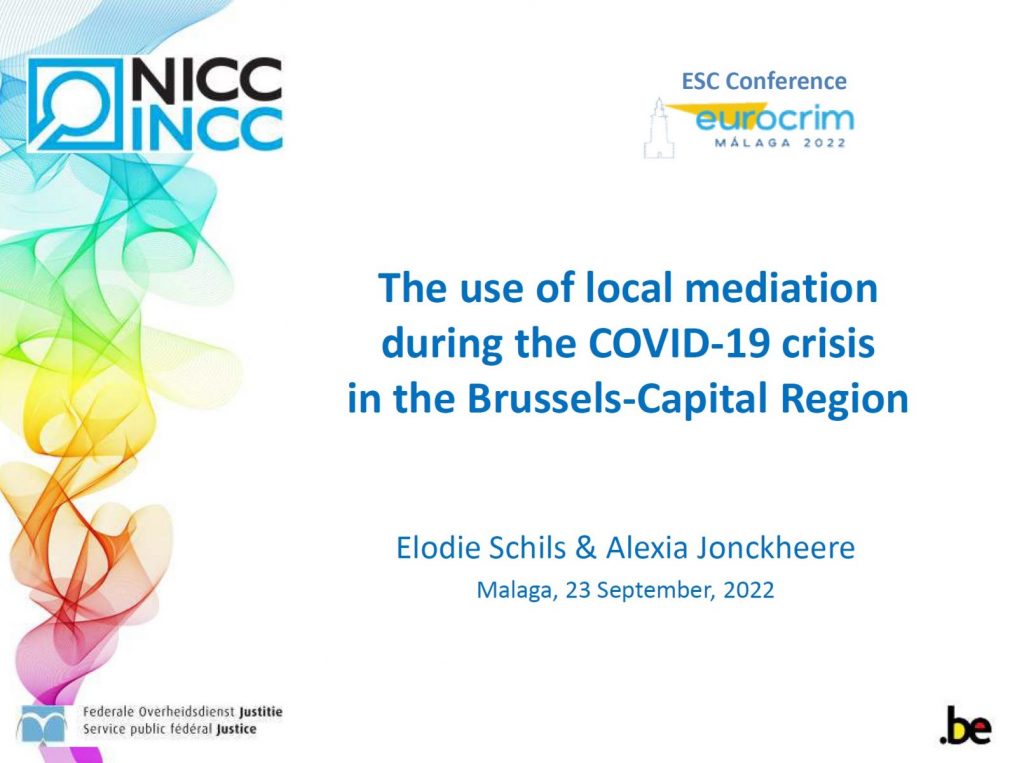
The health crisis has led to many restrictions on individual freedoms, and failure to comply with them has been sanctioned, especially by administrative fines. However, municipalities also have the possibility to use mediation to promote compliance with local rules. A research conducted on the use of mediation in the Brussels-Capital Region during the health crisis shows that the measure is used in a circumstantial manner, for various reasons such as the legal framework but also the relations between actors. In our contribution, we will explain which opportunities but also which challenges local mediation (as well as mediators) was confronted with during the period of the health crisis.
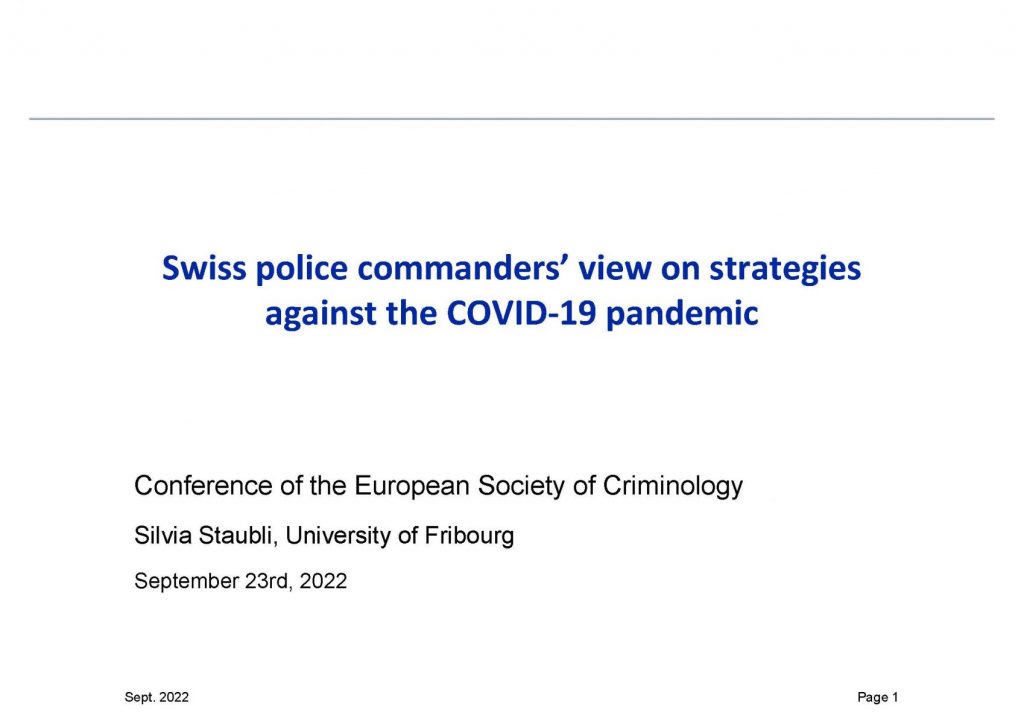
The COVID-19 pandemic generated policing challenges at several levels. At the organisational level, the police were confronted with expanded tasks, staff shortages, longer shifts and an associated increase in workload. Police strategies had to be adapted to the circumstances, e.g. through fewer traffic controls (Maskaly et al., 2021). As far as policing of the public space and of sanitary measures, in Switzerland, there was only a short stay-at-home period at the beginning of the pandemic in spring 2020, and measures such as mandatory masking were not introduced until autumn 2020. At this time, public criticism of the anti-COVID-19 measures was steadily increasing, and new groups of protesters organised several anti-Corona demonstrations throughout German-speaking Switzerland. This particularly challenged police corps in rural areas with little experience in handling larger demonstrations. Based on interviews with Swiss police commanders, this paper highlights the challenges and obstacles faced by the police during the COVID-19 pandemic in Switzerland. It examines in terms of threats and opportunities, strengths, and weaknesses, how the police perceived their work during the pandemic in terms of challenges and opportunities, and how they enforced related measures.